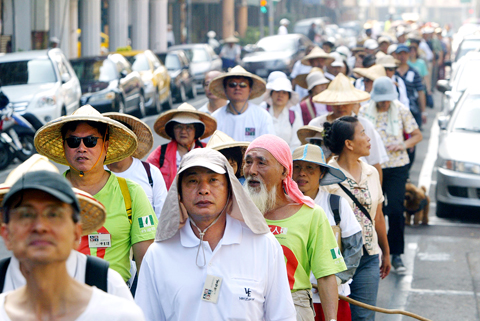The People’s Sovereignty Movement — a 49-day protest walk to promote changes to the Referendum Act (公民投票法) and push for referendums on all cross-strait agreements — departed yesterday from Longshan Temple (龍山寺) in Taipei.
People from all walks of life — teachers, college students, shop owners, workers, social activists, Christian ministers and Buddhist monks — gathered at the square in front of the temple to sign up for the protest. Politicians such as former vice president Annette Lu (呂秀蓮) also took part.
Several civic groups, including the Nuke-4 Referendum Initiative Association, the Union of Taiwanese Teachers, the Green Formosa Front Association and the Taiwan Labor Front, organized the walkathon.

PHOTO: CNA
As people prepared to begin the walk, a Buddhist monk held a placard written in English that read “ECFA — No.”
ECFA stands for “economic cooperation framework agreement,” a deal that the government plans to sign with China to establish closer economic ties, but some groups have raised doubts about the proposal.
Many people brought banners and signs voicing their concern that signing an ECFA might result in higher unemployment because more factories may move to China and less expensive Chinese products may be dumped on the Taiwanese market.
“The People’s Sovereignty Movement believes that cross-strait agreements concern the country’s sovereignty and the people’s welfare, and thus should be ratified by the people via referendums,” said Chen Li-chun (鄭麗君), a spokeswoman for the movement.
“We urge the public to demand that President Ma Ying-jeou [馬英九] initiate a referendum to ask the people if they agree that Taiwan should sign agreements with China under the ‘one China’ principle as stated in Article 17 of the Referendum Act,” she said. “The Executive Yuan should also propose amendments to the law so that it becomes a better tool of direct democracy.”
Article 17 of the law stipulates that the president may initiate a referendum if the country is under threat from an outside force or if its sovereignty may be compromised.
Chen Li-kuei (陳麗貴), a movement leader, urged more people to “say with our feet what we, the masters of the country, want.”

INVESTIGATION: The case is the latest instance of a DPP figure being implicated in an espionage network accused of allegedly leaking information to Chinese intelligence Democratic Progressive Party (DPP) member Ho Jen-chieh (何仁傑) was detained and held incommunicado yesterday on suspicion of spying for China during his tenure as assistant to then-minister of foreign affairs Joseph Wu (吳釗燮). The Taipei District Prosecutors’ Office said Ho was implicated during its investigation into alleged spying activities by former Presidential Office consultant Wu Shang-yu (吳尚雨). Prosecutors said there is reason to believe Ho breached the National Security Act (國家安全法) by leaking classified Ministry of Foreign Affairs information to Chinese intelligence. Following interrogation, prosecutors petitioned the Taipei District Court to detain Ho, citing concerns over potential collusion or tampering of evidence. The

‘FORM OF PROTEST’: The German Institute Taipei said it was ‘shocked’ to see Nazi symbolism used in connection with political aims as it condemned the incident Sung Chien-liang (宋建樑), who led efforts to recall Democratic Progressive Party (DPP) Legislator Lee Kun-cheng (李坤城), was released on bail of NT$80,000 yesterday amid an outcry over a Nazi armband he wore to questioning the night before. Sung arrived at the New Taipei City District Prosecutors’ Office for questioning in a recall petition forgery case on Tuesday night wearing a red armband bearing a swastika, carrying a copy of Adolf Hitler’s Mein Kampf and giving a Nazi salute. Sung left the building at 1:15am without the armband and apparently covering the book with a coat. This is a serious international scandal and Chinese

Seventy percent of middle and elementary schools now conduct English classes entirely in English, the Ministry of Education said, as it encourages schools nationwide to adopt this practice Minister of Education (MOE) Cheng Ying-yao (鄭英耀) is scheduled to present a report on the government’s bilingual education policy to the Legislative Yuan’s Education and Culture Committee today. The report would outline strategies aimed at expanding access to education, reducing regional disparities and improving talent cultivation. Implementation of bilingual education policies has varied across local governments, occasionally drawing public criticism. For example, some schools have required teachers of non-English subjects to pass English proficiency

TRADE: The premier pledged safeguards on ‘Made in Taiwan’ labeling, anti-dumping measures and stricter export controls to strengthen its position in trade talks Products labeled “made in Taiwan” must be genuinely made in Taiwan, Premier Cho Jung-tai (卓榮泰) said yesterday, vowing to enforce strict safeguards against “origin laundering” and initiate anti-dumping investigations to prevent China dumping its products in Taiwan. Cho made the remarks in a discussion session with representatives from industries in Kaohsiung. In response to the US government’s recent announcement of “reciprocal” tariffs on its trading partners, President William Lai (賴清德) and Cho last week began a series of consultations with industry leaders nationwide to gather feedback and address concerns. Taiwanese and US officials held a videoconference on Friday evening to discuss the